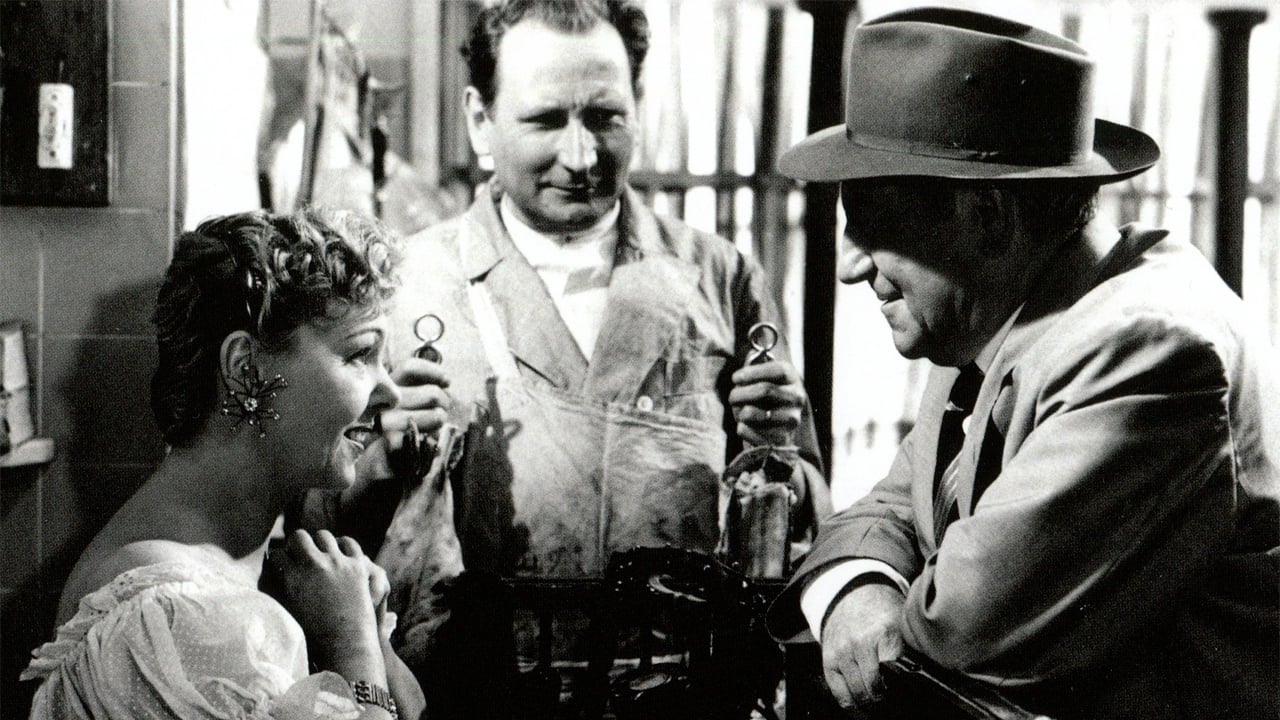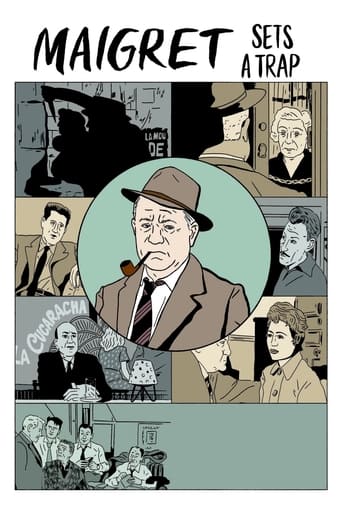Maidgethma
Wonderfully offbeat film!
BroadcastChic
Excellent, a Must See
SparkMore
n my opinion it was a great movie with some interesting elements, even though having some plot holes and the ending probably was just too messy and crammed together, but still fun to watch and not your casual movie that is similar to all other ones.
StyleSk8r
At first rather annoying in its heavy emphasis on reenactments, this movie ultimately proves fascinating, simply because the complicated, highly dramatic tale it tells still almost defies belief.
Bob Taylor
This year was devoted to deepening my appreciation of Simenon's works; this is the best film version of his novels. From the first scene, with a nervous Insp. Lagrume trying to keep abreast of a violent confrontation in the Place des Vosges--the fourth killing by a sadistic serial killer--to the ending with Lagrume again trying to curry favour with an exasperated Maigret, this film held me spellbound. The acting is superb: Gabin has his best role since the glory days with Renoir in the 30's, Desailly is extraordinary as the wretched Maurin, pulled by mother and wife both and hating it, Annie Girardot is wonderfully sensual and determined as the young wife, and Lucienne Bogaert plays the mother from Hell with the greatest skill. The hatred the two women have for each other is palpable. All the supporting players turn in fine work, especially Gerard Sety as Jojo the gigolo who manages to stir the emotions of Yvonne Maurin, for a while at least.It seems there is no general Region 1 release for this film; that's a real shame. I found a cheap knockoff without special features in a cutout bin in Montreal. Please let's have a proper reissue.
oOgiandujaOo_and_Eddy_Merckx
Jean Gabin plays Inspector Maigret here in a role that I find him quite matched to. I always figured him as fitting kindly roles after watching him play gangsters so often (the French have had an ambivalent, occasionally adulatory disposition towards gangsters judging from their domestic movie output, which perhaps makes these roles for Gabin less of a clang for them - perhaps this is similar to our English views of Robin Hood and Dick Turpin!).I came to this movie via an interest in director Jean Delannoy. Even though it appears to be a very commercial project he's helming on behalf of a studio, rather than a more obviously auteur-driven piece such as "L'Eternel Retour", there are perhaps significant parallels with his other work. Delannoy, I believe, was preoccupied with matters Oedipal, definitely by family conflict of the dysfunctional variety, and you can see this, for example, in "La Symphonie Pastorale", where a father and son both fall in love with the same woman, also in "L'Eternel Retour" with the damaged Achille, spoiled by his parents, and in "Macao, enfer de jeu", where Ying Tchaï's entire life is concealed from the daughter he dotes on.Whilst Maigret Sets a Trap is about, "la chasse au tigre", or a tiger hunt, with the Marais killer being the tiger, there's also a story of inter-generational abuse that's powerful and fascinating. I felt I learnt several lessons whilst watching the movie, particularly about the power of jealousy to provoke extravagant paranoias (under which lie quite delicate realities) and how the truth is often more human than you think, also about temperance (Maigret makes a joke about being unable to obtain attractive partners), and appearances. I'm fascinated about private versus public realities, ever since seeing Paul Klee's beautiful series of "Der Komiker" ("The Comedian") etchings as a teenager. These show men wearing masks that look like faces, and you can see the real, quite different, faces behind. In this movie there's a huge divide between persona and the repressed and crippled personalities behind them.Today's audiences may find that Jean Desailly (Marcel Maurin) overacts, but I think Delannoy is far cleverer than is often given credit for, and provides his own commentary on the style of acting in the movie, when Maigret is at pains to instruct a con on how to act to the press.I think I fell in love with this movie, because I was never really sure where it was going, and there's some dirty thoughts to be had if you get inside the paranoia. There's also not many movies where you have such a human detective, who even conducts a late night interview with his undone belt surrounding a bulging belly. The ending is quite iconic in its own way, and rounded off a charming watch.
Cristi_Ciopron
Among the less famous movies made by Gabin in his 50s,there are two I love most:Maigret Lays a Trap and The Baron of the Locks;the two have 4 things in common:Gabin,Delannoy,a Simenon adaptation,and Desailly in a supporting role.Maigret Lays a Trap serves also as an access,an introduction to the young Mrs. Girardot's charm and womanhood.Gabin seems in high spirits and very willing to act and to mold a splendor of an ample role:that of a mammoth police inspector.The atmosphere is very adequate and fitting.The pace is good,alert,nimbly done.This movie is concise,sharp,practical,each actor is cut out for the part.Mrs. Girardot was fresh,appetizing,lustful and extremely sexual,she shows finesse and goes far.(Delannoy tasted the womanhood and knew how to make such portraits of women:in The Baron of the Locks,there is the delicious Blanchette Brunoy.It is obvious he had a taste for portraying women.)"Maigret ..." takes pride in its quartet of actors:Gabin,Mrs. Girardot,Desailly (the director Delannoy would use Desailly again in another Simenon adaptation featuring Gabin:"The Baron of the Locks ") and Ventura in a bit,unimportant part.Hussenot is interesting as "Lagrume". Desailly plays an adipose,slippery, faint-hearted youngster with a psychotic air,a queer customer. Mrs. Girardot is very noticeable and lucent, lurid, luminous.Maigret tend Un Piège (1958) is the first of the Gabin's "Maigrets",and a relish.Gabin was 54 years when he made this role.Gabin should have made many more such "Maigret" movies,and less trucker roles.The crime movies were seldom honored with an acting so classy.Jean Delannoy was a very competent,efficient,very pragmatic, intelligent, capable director,and he made some very pleasing Simenon adaptations with Gabin.Delannoy showed up to be a clear-sighted director.(Contrary to what is said by a few,Gabin worked with many good directors,such as Renoir ,Carné,Duvivier,Ophuls,Becker,some of them now despised by nerds.)I don't seek the Gabin's "Maigrets" for the joys only Simenon's novels can offer;the flicks provide joys of their own.The novels' Maigret is a very different one;Gabin's is tough,brusque,authoritarian,sometimes irascible,gives everybody the ha-ha.This movies are on their own.Maigret was one of the best Gabin roles,and it is fair that all 3 "Maigret" movies are included in the list of Gabin's 17 "Incontournables". Gabin made one of the best policemen in cinema's history.
guy-bellinger
Alongside Molinaro's "La Mort de Belle", the best adaptation of a Simenon story for the big screen.Helmer Delannoy proves a past master at creating a stifling atmosphere ( night scenes, a hot stormy weather, a heady melody pervading the story ), managing to make the tension rise and swell regularly until it explodes in a triple climax ( Maurice's interrogation, the confrontation of Maurice's wife and mother, the final attempt to murder Mauricette ). So, when the rain finally starts falling in the final seconds of the movie, it does as much good to bulky, weary Gabin as it does to the tense viewer.Of course, the film benefits from a great interpretation : Jean Gabin gives life to his determined-shrewd-exhausted "commissaire" while Jean Desailly shines as the poor but dangerous Maurice whose boyhood has been prolonged by the misguided love of his mother ( Lucienne Bogaërt, perfect ). And Annie Girardot plays subtly and with welcome restraint the loving wife of a monster.Sure, Misraki's music and song are haunting and the camera-work is sleek, but what actually makes this film a major work is that the authors( R.M.Arlaud, Delannoy and Audiard ) are true to the spirit of Simenon : disillusioned with human nature but sympathetic with those who are its victims, however monstrous they may appear to society.

